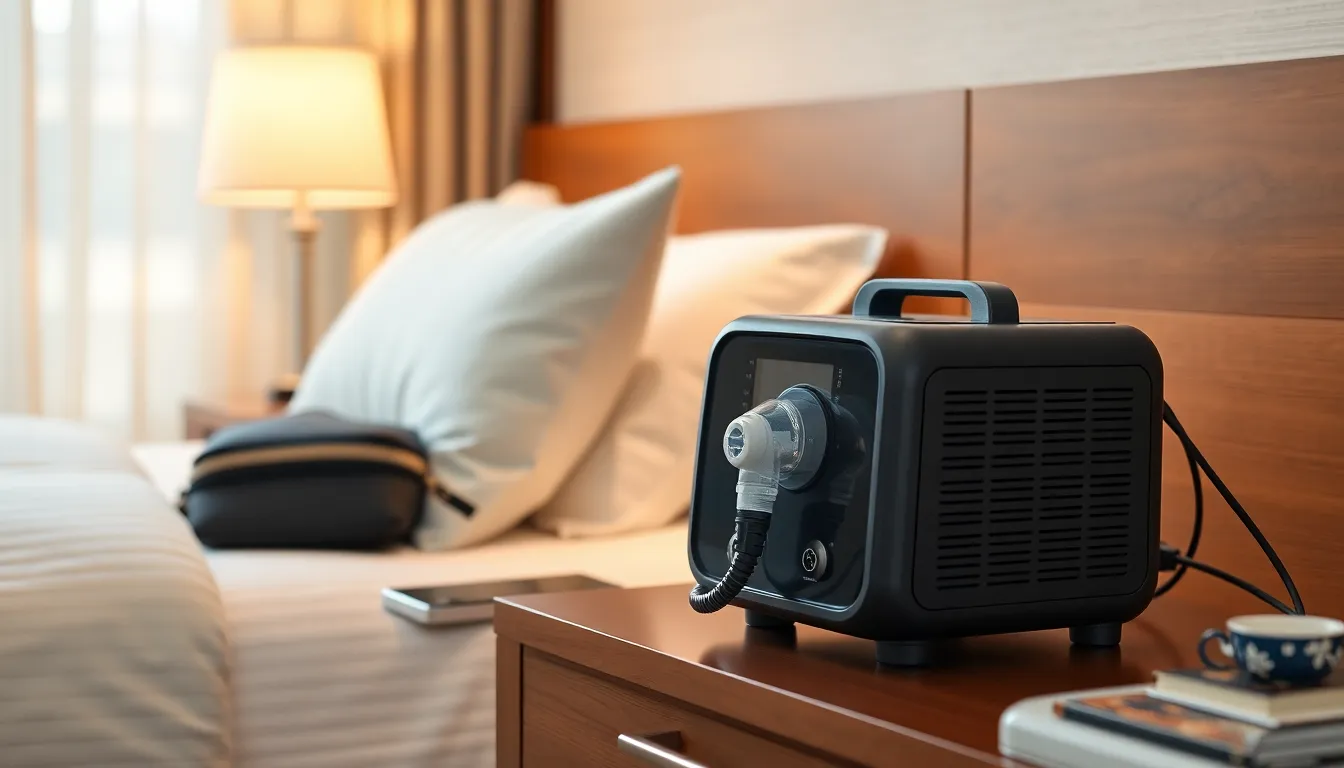Traveling with a CPAP machine might feel like packing a small elephant, but it doesn’t have to be that way. Enter the portable CPAP—a game-changer for sleep apnea warriors who refuse to let their condition cramp their travel style. These lightweight devices are designed to fit snugly in your suitcase without turning it into a workout session at the airport.
Portable CPAP for Travel
Portable CPAP machines offer significant advantages for travelers dealing with sleep apnea. These devices enhance comfort and convenience, allowing for a better travel experience.
Improved Sleep Quality
Enhanced sleep quality stands out as a primary benefit. Users of portable CPAP machines often enjoy steady airflow, preventing disruptions during sleep. Consistent therapy leads to deeper, more restorative sleep patterns. Individuals report fewer sleep disturbances, making them feel more energized and alert. This improvement in sleep translates directly into better daytime functioning, reducing fatigue.
Convenience and Portability
Convenience and portability are major selling points. Lightweight designs make these machines easy to carry in luggage without adding weight. Most portable options are compact, fitting in small spaces without sacrificing functionality. Quick setup simplifies usage, allowing users to adapt to new environments effortlessly. Many models come with travel-friendly features, such as built-in batteries or adaptable power supplies, making them suitable for various destinations.
Choosing the Right Portable CPAP

Selecting the right portable CPAP machine ensures a restful night’s sleep while traveling. Consider several key features to find a model that meets individual needs.
Key Features to Consider
Look for lightweight designs. They simplify transport without adding bulk. Battery life plays a crucial role. Devices with extended battery life provide flexibility during trips. Noise levels matter, too. A quieter CPAP enhances sleep for both the user and travel companions. Humidification options can improve comfort. Integrated humidifiers prevent dryness during use. Finally, size and weight are critical factors; compact models fit easily in luggage.
Popular Models on the Market
The ResMed AirMini stands out for its small size and connectivity options. Users appreciate its adaptability, making it suitable for different environments. Philips DreamStation Go offers a built-in battery and lightweight construction, appealing to frequent travelers. Consider the Z1 Travel CPAP; it’s often noted for its quiet operation and ease of use. Each model provides unique features, ensuring travelers find the perfect fit for their needs.
Tips for Traveling with a Portable CPAP
Traveling with a portable CPAP machine requires planning to ensure comfort during sleep. Follow these tips for a hassle-free experience.
Packing and Transporting Your Device
Organize the CPAP components in a travel-friendly bag. Make sure to include the power cord, mask, and any additional accessories. Removal of the humidifier can reduce bulk, making it easier to pack. Choose a bag that offers padding to protect the device during transport. Storing the machine in a carry-on bag prevents loss or damage during checked luggage transport. Consider using compression bags to save space with clothing, ensuring the CPAP unit remains unaffected. Verify that batteries are charged when traveling to remote areas.
Maintaining Your CPAP While Traveling
Cleaning the CPAP machine before departure ensures optimal hygiene. Pack supplies like wipes or small cleaning brushes to maintain the mask and tube during the trip. Setting up in a clean, dry space avoids contamination. Use distilled water for humidification if applicable, as tap water could lead to mineral buildup. Rinse the mask with water regularly to maintain comfort and prevent odor. Frequent inspection of equipment for damages or wear keeps the device functioning well. Always follow manufacturer guidelines for maintenance to ensure longevity.
Insurance and Cost Considerations
Portable CPAP machines involve specific costs and insurance considerations. Coverage for these devices varies by insurance provider and individual plans. Many private insurers may reimburse a portion of the purchase cost when a prescription is provided. Medicare typically covers portable CPAP machines, but it’s crucial to verify coverage details beforehand.
Cost remains a significant factor when selecting a portable CPAP machine. Prices range from $300 to over $1,000. Customers often find that features such as built-in batteries and increased portability affect pricing. Beyond the initial purchase, patients should factor in ongoing expenses like masks, filters, and tubing replacements.
Negotiating with providers or pharmacies can sometimes lead to better pricing options. Some suppliers may offer discounts or payment plans for those feeling the financial strain. Checking for online retailers can also uncover competitive pricing on models. Moreover, specific manufacturers provide financing options, making it easier to afford necessary equipment.
Insurance policies may also cover travel-related accessories. Patients can inquire about coverage for carrying cases and additional hygiene supplies. These items enhance travel convenience, ensuring proper care and maintenance while on the go.
Patients benefit from seeking out flexible options regarding warranty and return policies. Some portable CPAP manufacturers offer generous refunds or exchanges, allowing users to test devices risk-free. Clarifying these terms can alleviate concerns about making the wrong choice.
Owning a portable CPAP machine is an investment in health and well-being. Users should weigh the costs against the benefits of improved sleep quality on trips. Prioritizing financial and insurance considerations leads to informed and satisfying choices.
Conclusion
Traveling with a portable CPAP machine transforms the experience for those with sleep apnea. It allows them to maintain their routines and enjoy restful nights no matter where they are. The lightweight and compact designs make these devices a practical choice for any traveler.
Choosing the right portable CPAP can enhance comfort and ensure a good night’s sleep. With various models available, travelers can find one that fits their needs and lifestyle. By prioritizing maintenance and packing smartly, users can enjoy uninterrupted sleep while on the go.
Investing in a portable CPAP machine not only supports health but also enhances overall travel experiences. With the right preparation, individuals can embrace their adventures without compromising their well-being.



